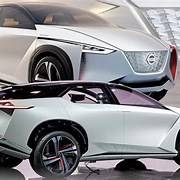NISSAN HONDA CRISIS.
The auto industry is abuzz with rumors of a potential merger between two of Japan’s most iconic automakers—Honda and Nissan. What started as a technical partnership between the two companies is now being speculated as a full-blown merger, a development that has sent shockwaves through the industry, Wall Street, and even among consumers. For fans and owners of Honda or Nissan vehicles, this news may come as a surprise. However, there’s a deeper story behind this potential union, and its implications could reshape the global car business.
Nissan has been facing mounting challenges in recent years. Once a dominant force in the auto industry, the company has struggled with declining sales, financial instability, and a tarnished reputation following the high-profile departure of its former CEO, Carlos Ghosn. The global chip shortage, combined with increased competition and the pressure to transition to electric vehicles (EVs), has only exacerbated Nissan’s difficulties. In contrast, Honda, while not immune to the challenges facing automakers worldwide, has remained relatively stable, with strong sales and a clear strategy for EV development.
The two companies initially entered a technical partnership to collaborate on developing next-generation vehicles, including EVs and autonomous driving technology. Such collaborations are becoming increasingly common in the automotive world as manufacturers seek to share the high costs of research and development. However, the idea of a merger suggests that Nissan’s financial struggles may be more severe than initially thought. For Honda, a merger could provide access to additional resources, technologies, and market share, particularly in regions where Nissan has a strong presence.
If this merger goes forward, it would represent a seismic shift in the automotive landscape. Together, Honda and Nissan could create a powerful alliance capable of competing with industry giants like Toyota, Volkswagen, and Tesla. The combined resources and expertise of both companies could accelerate the development of EVs, strengthen their supply chain resilience, and create synergies in manufacturing and distribution. Additionally, their shared focus on innovation could lead to exciting new products that blend Honda’s reputation for reliability with Nissan’s history of bold, cutting-edge designs.
However, a merger would not come without challenges. Integrating two companies with distinct corporate cultures, business strategies, and product lineups is a complex and potentially risky endeavor. Nissan’s financial troubles could also pose a burden for Honda, which would need to balance helping its partner recover while maintaining its own stability. Consumer perception is another factor to consider, as fans of each brand may have mixed feelings about such a significant change.
For the broader auto industry, a Honda-Nissan merger could spark a new wave of consolidation. As the race toward electrification and automation heats up, smaller or struggling automakers may seek similar partnerships to remain competitive. This potential deal serves as a reminder of the enormous pressures reshaping the automotive world, pushing companies to think creatively about how to survive and thrive in an era of rapid change.
Whether this merger materializes or not, it signals a pivotal moment for both Honda and Nissan—and for the industry as a whole. For now, all eyes will remain on Japan as these two automakers navigate the challenges and opportunities that lie ahead.



No comments yet
Be the first to share your thoughts!